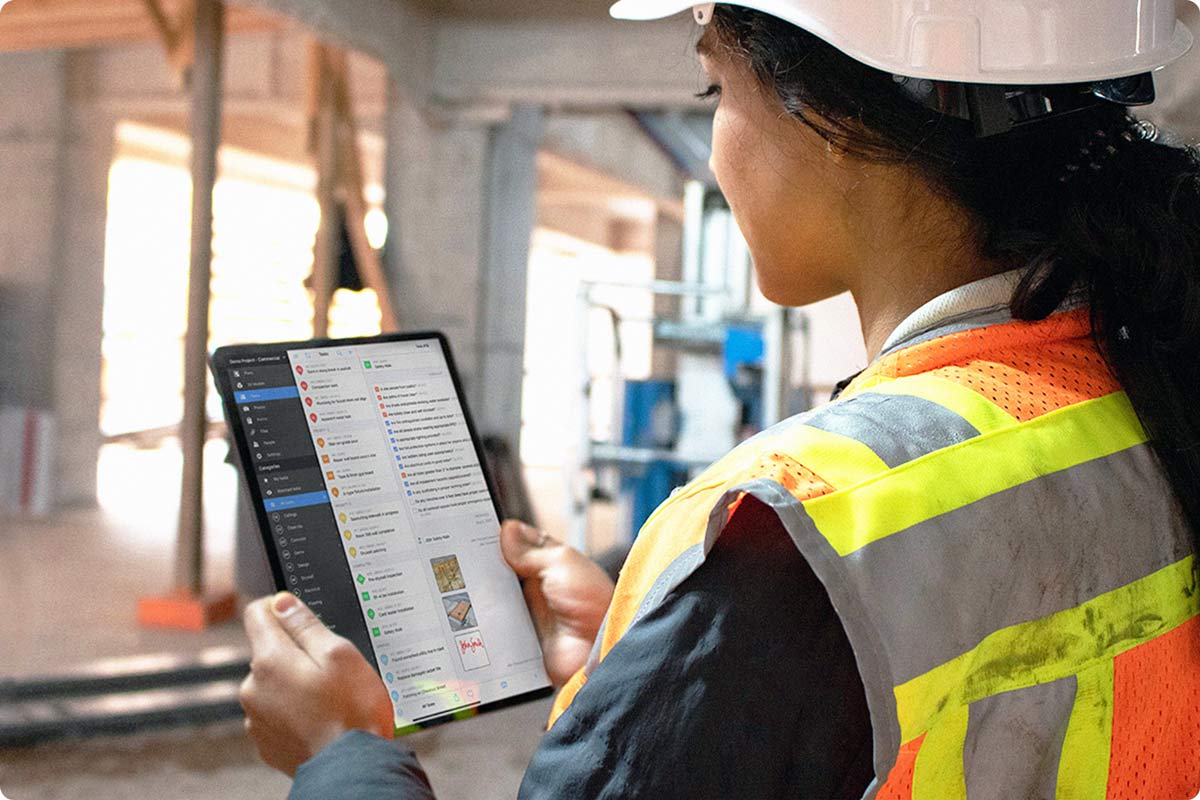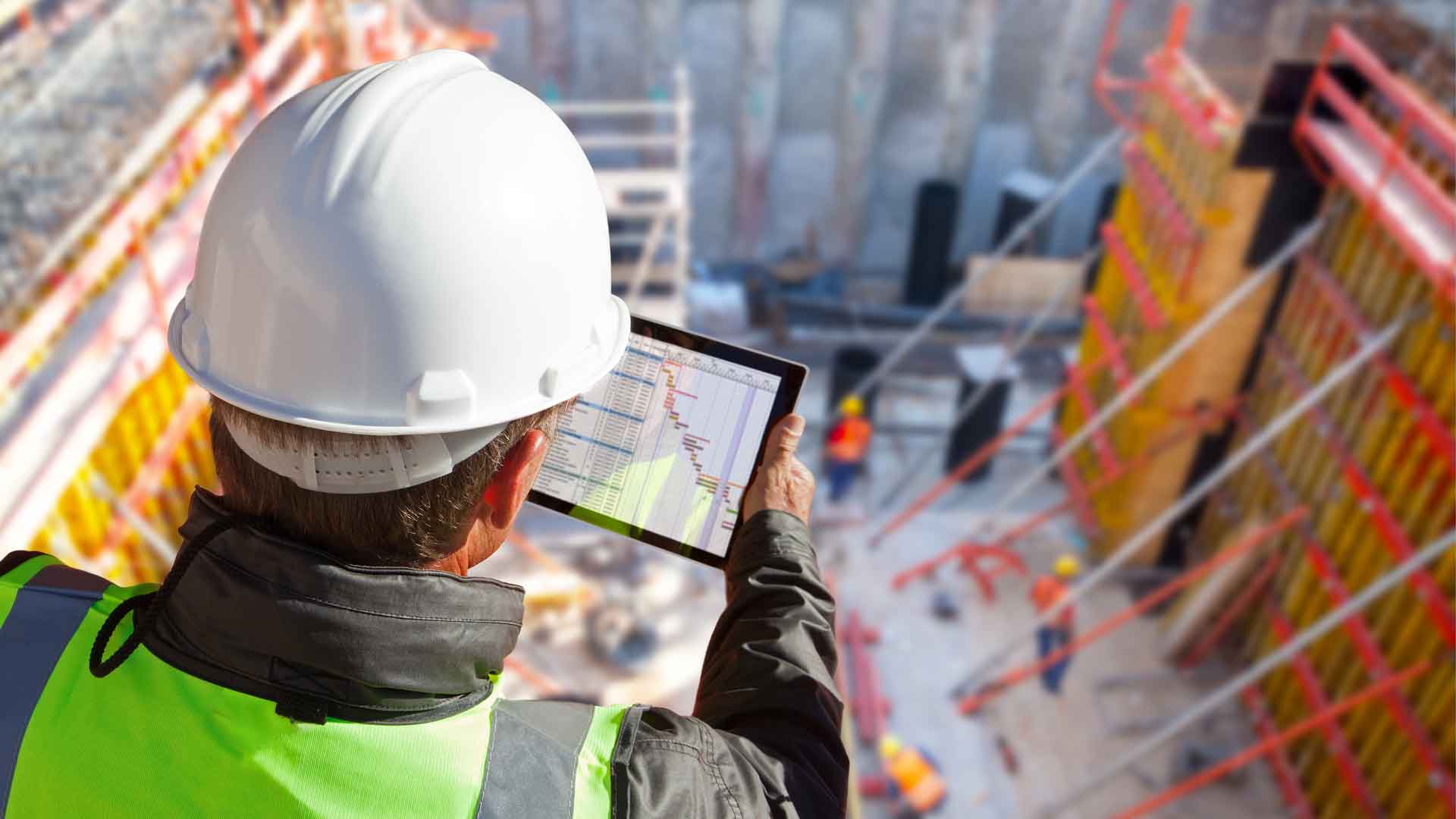Home>diy>Building & Construction>How To Be A Good Project Manager In Construction


Building & Construction
How To Be A Good Project Manager In Construction
Modified: January 9, 2024
Learn the essential skills and techniques to become a successful project manager in the field of building construction. Master the art of planning, organizing, and leading construction projects with our comprehensive guide.
(Many of the links in this article redirect to a specific reviewed product. Your purchase of these products through affiliate links helps to generate commission for Storables.com, at no extra cost. Learn more)
Introduction
In the dynamic world of construction, project managers play a vital role in ensuring the successful execution of building projects. With their diverse skill set and in-depth knowledge of the construction industry, project managers are the driving force behind the seamless coordination of various stakeholders, efficient allocation of resources, and timely completion of projects.
Being a project manager in construction is no easy task. It requires a unique blend of technical expertise, leadership abilities, and effective communication skills. From planning and scheduling to risk management and problem-solving, a good project manager must be well-rounded and adaptable to the challenges that come their way.
In this article, we will explore the key skills and qualities of a good project manager in construction. We will delve into the critical aspects of project management, including effective planning, stakeholder management, team leadership, risk management, quality assurance, budgeting, and conflict resolution. By understanding these core areas, aspiring project managers and industry professionals can gain valuable insights to help them excel in their roles.
Whether you are a seasoned project manager looking to enhance your skills or someone considering a career in construction project management, this article will provide you with the essential knowledge and strategies required to be a standout project manager in the construction industry.
So let’s dive into the world of construction project management and discover how to become a successful project manager in this challenging and rewarding field.
Key Takeaways:
- Successful project management in construction requires a diverse skill set, including technical expertise, leadership abilities, and effective communication. By mastering these skills, project managers can navigate challenges and deliver successful outcomes.
- Effective planning, stakeholder management, team leadership, risk management, ensuring quality and compliance, budgeting and cost control, and proficient conflict management are essential skills for project managers in the construction industry.
Read more: What Is Construction Quality Management
Understanding the Role of a Project Manager in Construction
In the realm of construction, the project manager is akin to the captain of a ship. They oversee every aspect of the project, from its inception to its completion, ensuring that it stays on track and within budget while meeting the highest quality standards. The role of a project manager goes far beyond just overseeing the construction process; it involves strategic planning, meticulous coordination, effective communication, and a deep understanding of the construction industry.
One of the primary responsibilities of a project manager is to develop a comprehensive project plan. This includes defining project objectives, establishing timelines, and outlining the activities and resources required to achieve those objectives. The project manager must analyze the scope of work, create realistic budgets, and identify any potential risks or challenges that may arise during the construction process.
Once the project is underway, the project manager acts as the central point of communication for all stakeholders. This involves liaising with clients, architects, engineers, subcontractors, and government authorities. By effectively managing these relationships, project managers can foster strong collaborative partnerships, ensure clarity of expectations, and address any issues or concerns that may arise.
In addition to communication, a project manager must also possess exemplary leadership skills. They are responsible for assembling and managing a diverse team of professionals and ensuring that everyone is working towards a common goal. Effective team management involves delegating tasks, providing guidance and support, and fostering an environment of collaboration and accountability.
Furthermore, project managers must possess a thorough understanding of the technical aspects of construction. This includes knowledge of building codes, regulations, and industry best practices. By staying up to date with the latest advancements and trends in construction technology, project managers can make informed decisions regarding material selection, construction methods, and cost-saving measures.
Another crucial aspect of a project manager’s role is risk management. Construction projects are inherently complex and prone to various risks, such as delays, budget overruns, and safety hazards. A skilled project manager identifies potential risks early on, develops mitigation strategies, and oversees their implementation. This proactive approach minimizes the impact of risks on the project timeline and budget.
Overall, the role of a project manager in construction requires a combination of technical skills, leadership abilities, and strong interpersonal communication. It is a challenging yet rewarding position that involves overseeing the entire construction process, from conception to completion. By understanding the role and its responsibilities, aspiring project managers can pave the way for a successful career in the construction industry.
Key Skills and Qualities of a Good Project Manager
Being a successful project manager in the construction industry requires a unique set of skills and qualities that go beyond technical knowledge. Let’s explore some of the key skills and qualities that differentiate a good project manager from the rest.
1. Leadership: Project managers must possess excellent leadership skills to guide and motivate their team to achieve project goals. They inspire trust and confidence, delegate tasks effectively, and provide guidance and support when needed.
2. Communication: Effective communication is crucial in project management. Project managers must be able to clearly convey their expectations, goals, and project updates to stakeholders, including clients, team members, subcontractors, and government authorities. They must also be active listeners, able to understand and address any concerns or issues raised by team members or clients.
3. Organizational Skills: Project managers are responsible for overseeing multiple tasks, timelines, and resources simultaneously. Strong organizational skills are essential to plan and prioritize effectively, ensuring that projects stay on track and within budget. They must also be adept at managing documentation and contracts to maintain project integrity.
4. Problem-Solving: Construction projects often encounter unexpected challenges, and project managers must be skilled problem solvers. They need to identify issues, analyze potential solutions, and make timely decisions to keep the project moving forward. Adaptability and creative thinking are key in finding innovative solutions to complex problems.
5. Negotiation: Project managers frequently engage in negotiations with clients, subcontractors, and suppliers. They must possess strong negotiation skills to secure favorable contracts, manage change orders effectively, and maintain positive relationships with all parties involved.
6. Technical Knowledge: While project managers are not expected to be experts in every aspect of construction, they should possess a strong foundation of technical knowledge. This includes understanding construction methods, materials, and building codes to ensure compliance and make informed decisions.
7. Time and Resource Management: Project managers are responsible for optimizing project timelines and efficiently allocating resources. They need to balance competing priorities, manage risks, and ensure that projects are completed within set budgets and schedules.
8. Collaboration: Construction projects involve the collaboration of multiple stakeholders from different disciplines. A good project manager fosters a collaborative and inclusive environment, encouraging teamwork and effective communication amongst team members.
9. Attention to Detail: Construction projects involve intricate details that must be carefully monitored. Project managers must possess keen attention to detail to identify potential issues or discrepancies and ensure quality control throughout the project.
10. Ethics and Integrity: Project managers are entrusted with significant responsibilities, and their actions impact the success of the project and the reputation of the organization. Demonstrating high ethical standards and integrity is crucial to establish trust and maintain professional relationships.
By possessing a combination of these skills and qualities, project managers can effectively lead construction projects and ensure their successful execution. Continuous learning, self-improvement, and staying updated with industry advancements are essential for project managers to thrive in this dynamic and evolving field.
Effective Planning and Scheduling in Construction Projects
Planning and scheduling are critical components of construction project management. A well-thought-out plan and a comprehensive schedule lay the foundation for a successful project, ensuring that resources are allocated efficiently, tasks are completed in a timely manner, and project objectives are achieved. Let’s explore the key elements of effective planning and scheduling in construction projects.
1. Defining Project Objectives: The first step in effective planning is to clearly define the project objectives. This involves establishing the scope of work, identifying deliverables, and setting specific goals and milestones. A well-defined project scope provides clarity, helps manage expectations, and allows for accurate planning and scheduling.
2. Work Breakdown Structure (WBS): Once the project objectives are defined, the next step is to develop a work breakdown structure. The WBS breaks down the project into smaller, manageable tasks, providing a hierarchical structure and a clear roadmap for the project. This helps in assigning responsibilities, estimating time and resources required for each task, and creating a realistic schedule.
3. Estimating Time and Resources: Accurate estimation of time and resources is crucial for successful project planning. This involves analyzing the tasks, considering dependencies, and accounting for potential risks and uncertainties. Project managers must gather input from team members and subject matter experts to ensure realistic estimates.
4. Developing a Project Schedule: With the work breakdown structure and accurate estimations in place, project managers can develop a detailed project schedule. The schedule outlines the sequence of tasks, milestones, and deadlines for completing each component of the project. It helps in identifying critical paths and potential bottlenecks, allowing for effective allocation of resources and the identification of project constraints.
5. Resource Allocation: Efficient allocation of resources, including manpower, equipment, and materials, is crucial for project success. Project managers must prioritize tasks, balance workloads, and optimize resource utilization to ensure productivity and avoid delays.
6. Regular Monitoring and Tracking: Once the project is underway, it’s essential to monitor and track progress regularly. This involves comparing the actual progress against the planned schedule, identifying any deviations or delays, and taking corrective actions as necessary. Project management software and tools can assist in real-time tracking and reporting.
7. Contingency Planning: Construction projects are susceptible to unforeseen circumstances that can disrupt the schedule and impact project delivery. Implementing contingency plans and risk management strategies, such as having alternative suppliers or backup resources, helps mitigate potential delays and ensures continuity.
8. Collaboration and Communication: Effective planning and scheduling require open communication and collaboration among project stakeholders. Project managers must foster regular communication with the project team, clients, subcontractors, suppliers, and other relevant parties to ensure everyone is aligned, and potential issues are addressed promptly.
9. Flexibility and Adaptability: Construction projects are dynamic and can encounter changes or unforeseen events. Project managers must be flexible and adaptable to accommodate and manage these changes effectively. This may involve revising the schedule, adjusting resource allocation, or reassigning tasks.
10. Continuous Improvement: Project managers should consistently seek opportunities for process improvement and learn from past projects. By analyzing project outcomes, identifying areas for enhancement, and incorporating lessons learned into future planning and scheduling, project managers can enhance efficiency and optimize project performance.
Effective planning and scheduling are integral to the success of construction projects. By implementing a systematic and comprehensive approach, project managers can optimize resource allocation, minimize delays, and deliver projects on time and within budget. This not only ensures client satisfaction but also enhances the reputation of the project manager and the organization as a whole.
Managing Stakeholders and Communication
In the complex landscape of construction projects, managing stakeholders and maintaining effective communication is essential for project success. Stakeholders include clients, contractors, subcontractors, suppliers, government authorities, and even the local community. Each stakeholder has unique needs, expectations, and interests that must be understood, addressed, and managed throughout the project lifecycle. Let’s delve into the key aspects of managing stakeholders and communication in construction projects.
1. Identifying Stakeholders: The first step in stakeholder management is to identify all relevant stakeholders. This involves conducting a thorough analysis of who will be affected by the project, both directly and indirectly. It’s crucial to include internal stakeholders (such as the project team and management) as well as external stakeholders (such as clients, local residents, and regulatory authorities).
2. Understanding Stakeholder Needs and Expectations: Once stakeholders are identified, project managers must engage in proactive communication and dialogue to understand their needs, expectations, and concerns. This can be done through surveys, meetings, interviews, and focus groups. By understanding stakeholders’ perspectives, project managers can tailor their communication strategies and project plans accordingly.
3. Developing a Stakeholder Engagement Plan: A stakeholder engagement plan outlines the strategies, methods, and frequency of communication with each stakeholder group. It ensures that stakeholders are informed, engaged, and involved throughout the project. The plan may include regular progress updates, meetings, newsletters, and even public consultations, depending on the project’s scale and impact.
4. Establishing Clear Communication Channels: Effective communication relies on establishing clear and accessible channels for information exchange. This may include regular status meetings, project management software for collaboration, email updates, and dedicated project portals. Project managers should ensure that stakeholders have easy access to project-related information and a reliable point of contact.
5. Adapting Communication Styles: Different stakeholders may have varying levels of technical expertise and understanding of construction processes. Project managers should be adaptable in their communication styles, using language that is easily understandable and providing additional explanations or visual aids when needed. This helps ensure that stakeholders are well-informed and can actively participate in project decisions.
6. Building and Maintaining Relationships: Effective stakeholder management involves building and nurturing relationships with all project stakeholders. This includes regular communication, active listening to concerns and feedback, and promptly addressing any issues that arise. Project managers should prioritize relationship-building to establish trust and create a collaborative working environment.
7. Managing Conflict: Construction projects can sometimes lead to conflicts or disagreements among stakeholders. Project managers must be skilled in conflict resolution, acting as mediators to find common ground and reach mutually beneficial solutions. By addressing conflicts early and transparently, project managers can minimize their impact on project progress and stakeholder relationships.
8. Ensuring Transparency and Accountability: Openness and transparency are vital in stakeholder management. Project managers should provide regular updates on project progress, including achievements, challenges, and potential risks. They should also take responsibility for any mistakes or delays and provide transparent explanations and remediation plans.
9. Considering Social and Environmental Impact: In many construction projects, social and environmental impact is a significant concern for stakeholders, especially local communities and regulatory authorities. Project managers must be attentive to these concerns, implementing measures to minimize negative impact and actively engaging stakeholders in discussions and decision-making.
10. Continuous Evaluation and Improvement: Stakeholder management and communication strategies should be continually evaluated and improved throughout the project. Feedback from stakeholders should be welcomed and incorporated into future plans to enhance engagement and ensure continual alignment with stakeholder needs and expectations.
Effective management of stakeholders and communication is vital for construction project success. By understanding and actively engaging with stakeholders, addressing their concerns, and maintaining open and transparent communication channels, project managers can create a collaborative environment that fosters a shared sense of ownership and leads to successful project outcomes.
Read more: What Is Construction Manager At Risk
Successful Team Management and Leadership
In construction projects, successful team management and leadership are crucial for achieving project objectives, maintaining productivity, and fostering a collaborative work environment. A project manager must possess strong leadership qualities to inspire and guide the project team towards success. Let’s explore key aspects of effective team management and leadership in the construction industry.
1. Building a Strong Team: The foundation of successful team management is assembling a competent and diverse team. Project managers should carefully select team members based on their skills, expertise, and compatibility with the project requirements. By fostering a supportive and inclusive environment, project managers can create a team that works well together and maximizes individual strengths.
2. Clearly Defined Roles and Responsibilities: Clearly defining roles and responsibilities within the team is essential for effective teamwork. This allows team members to understand their individual contributions, enhances accountability, and reduces confusion or duplication of efforts. Project managers should ensure that team members have a clear understanding of their duties and their connection to the overall project goals.
3. Effective Communication: Strong communication skills are fundamental to successful team management. Project managers should establish open and transparent communication channels, encouraging team members to express their ideas, concerns, and feedback. Regular project meetings, progress updates, and one-on-one discussions can facilitate effective communication and foster a sense of engagement and shared ownership.
4. Setting Clear Goals and Expectations: Project managers must set clear goals and expectations for the team. This involves defining project objectives, milestones, and deliverables in a way that aligns with the overall project vision. Clear goals provide team members with a sense of purpose and direction, enabling them to focus their efforts and work towards achieving project success.
5. Empowering and Motivating the Team: Successful team management involves empowering team members to take ownership of their work. Project managers should delegate tasks, provide autonomy, and trust their team to make decisions and solve problems. This not only empowers team members but also fosters a sense of ownership and accountability.
6. Recognizing and Rewarding Achievements: Recognizing and rewarding team members’ achievements is vital for fostering motivation and a positive work culture. Project managers should acknowledge individual and team accomplishments, publicly commend outstanding performance, and provide opportunities for professional growth and development.
7. Conflict Resolution: Conflict is inevitable in any team environment. As a leader, project managers must be skilled in conflict resolution strategies, fostering open communication, and addressing conflicts promptly and effectively. By facilitating constructive discussions and finding mutually agreeable solutions, project managers can maintain a harmonious and productive work environment.
8. Supporting Professional Development: Project managers should actively support the professional development of team members. This may involve providing training opportunities, mentorship programs, or encouraging participation in industry conferences and workshops. By investing in their team’s growth, project managers not only enhance the individual skills of team members but also foster a culture of continuous improvement.
9. Leading by Example: Project managers must lead by example and demonstrate the behaviors and qualities they expect from their team. This includes displaying professionalism, integrity, and a strong work ethic. By setting the standards high and embodying the values they seek in their team members, project managers inspire and motivate the team to perform at their best.
10. Encouraging Innovation and Collaboration: Encouraging innovation and collaboration is essential for achieving project success. Project managers should create an environment where team members feel comfortable sharing their ideas, experimenting with new approaches, and collaborating to find creative solutions. This promotes a culture of continuous improvement and drives innovation within the team.
Effective team management and leadership are critical to the success of construction projects. By building a strong team, setting clear goals and expectations, fostering communication and collaboration, resolving conflicts, and providing support and recognition, project managers can create a motivated, productive, and cohesive team that works together towards achieving project success.
Always communicate clearly with your team and stakeholders. Good communication is essential for keeping everyone on the same page and avoiding misunderstandings.
Risk Management in Construction Projects
Construction projects are inherently complex and involve various risks that can threaten project timelines, budgets, and overall success. Effective risk management is essential to identify, assess, and mitigate these risks to ensure project objectives are achieved. Let’s explore the key elements of risk management in construction projects.
1. Risk Identification: The first step in risk management is the identification of potential risks. This involves conducting a thorough analysis of project plans, scopes, and potential project environments. Project managers should engage stakeholders, project teams, and subject matter experts to identify both common and unique risks associated with the project. Risk identification should consider a wide range of factors such as safety hazards, design complexity, unforeseen ground conditions, labor availability, and regulatory compliance.
2. Risk Assessment and Analysis: Once risks are identified, project managers need to assess and analyze their potential impact and likelihood. This step involves quantifying the risks and their potential consequences to prioritize and focus on the most critical ones. Risk assessment enables project managers to allocate resources and develop suitable mitigation strategies based on the magnitude of the risk.
3. Development of Risk Response Strategies: After assessing the risks, project managers need to develop appropriate risk response strategies. This involves determining the best approach to address each risk. There are four main strategies: avoidance (eliminating the risk altogether), mitigation (reducing the likelihood or impact of the risk), transfer (shifting the risk to another party through contractual agreements), and acceptance (acknowledging and monitoring the risk without taking any specific action).
4. Implementing Risk Mitigation Measures: The next step is to implement risk mitigation measures to minimize the impact of identified risks. This may involve developing contingency plans, implementing safety measures, implementing quality control processes, conducting regular inspections, providing training to personnel, ensuring proper documentation, and utilizing appropriate insurance coverage. Project managers should ensure that these measures are integrated into the project plan and communicated to stakeholders effectively.
5. Monitoring and Reviewing Risks: Risk management is an ongoing process throughout the project lifecycle. Project managers must continually monitor and review risks to ensure that the implemented risk mitigation measures are effective and that any new risks are promptly identified and addressed. Regular updates and reporting on risk management are essential to keep stakeholders informed and maintain transparency.
6. Communication and Collaboration: Effective risk management requires open communication and collaboration among all project stakeholders. Project managers should establish clear communication channels to share risk-related information, updates, and mitigation strategies with the project team, clients, subcontractors, and regulatory authorities. Regular meetings and progress reports should be utilized to facilitate effective communication and ensure alignment of risk management efforts.
7. Contingency Planning: Despite careful risk management, unexpected events may still occur during construction projects. Therefore, project managers must develop contingency plans to respond to unforeseen risks. Contingency plans outline alternative courses of action to be taken if a risk materializes during the project execution. These plans should be regularly reviewed, updated as needed, and communicated to the project team.
8. Lessons Learned and Continuous Improvement: At the end of the project, it is essential to conduct a comprehensive review of the risk management efforts. Project managers should analyze the effectiveness of risk responses, the accuracy of risk assessments, and overall project outcomes. This evaluation process allows project managers to identify areas for improvement and capture lessons learned for future projects.
By implementing effective risk management practices, project managers can proactively identify, assess, and mitigate potential risks in construction projects. This helps ensure the project’s success, protect the interests of stakeholders, and create a safer and more efficient working environment. Continuous monitoring, collaboration, and improvement are essential to effectively manage risks throughout the project’s lifecycle.
Ensuring Quality and Compliance in Construction
Quality and compliance are paramount in the construction industry to ensure that projects meet the required standards, adhere to regulations, and deliver on client expectations. With the significant investment and potential impact on public safety, ensuring quality and compliance is a crucial aspect of construction project management. Let’s explore key considerations to ensure quality and compliance in construction projects.
1. Establishing Quality Objectives: The first step in ensuring quality is to establish clear quality objectives for the project. These objectives should align with client requirements, industry standards, and regulatory guidelines. By defining these objectives early on, project managers can set the foundation for quality management throughout the project lifecycle.
2. Developing a Quality Management Plan: A comprehensive quality management plan outlines the strategies, processes, and procedures that will be implemented to ensure quality throughout the project. This includes quality control measures, inspections, and tests that will be conducted at various stages of construction. The plan should also identify roles and responsibilities for quality assurance activities.
3. Implementing Quality Control Processes: Quality control involves monitoring and inspecting the construction process to ensure that it meets established quality standards. This may include regular inspections, material testing, and documentation of compliance with applicable codes and regulations. Project managers should establish clear protocols and standardized procedures to guide quality control activities.
4. Engaging Qualified and Competent Contractors: Ensuring quality and compliance also relies on engaging qualified and competent contractors and subcontractors. Project managers should conduct careful evaluations of potential contractors and verify their licenses, certifications, and past performance. Collaborating with experienced and reputable contractors enhances the likelihood of achieving the desired quality outcomes.
5. Adhering to Building Codes and Regulations: Compliance with building codes and regulations is essential to ensure safety, structural integrity, and legal compliance. Project managers should stay updated with the latest codes and regulations relevant to the project and ensure that all construction activities comply with these requirements. Regular inspections and thorough documentation are crucial in demonstrating compliance.
6. Implementing Quality Assurance Programs: Quality assurance focuses on the implementation of processes and systems to prevent defects and errors before they occur. This includes establishing quality benchmarks, conducting audits, and implementing feedback mechanisms to continuously improve quality performance. Quality assurance programs help identify potential issues and ensure corrective actions are taken proactively.
7. Engaging Stakeholders in Quality Assurance: Engaging key stakeholders, including clients, architects, and subcontractors, in the quality assurance process is vital. Open communication and collaboration allow for joint efforts in monitoring and improving quality outcomes. Regular meetings and progress reviews should be conducted to address any concerns or issues related to quality.
8. Documenting and Record-Keeping: Proper documentation and record-keeping throughout the project are essential in demonstrating compliance with quality standards and regulations. Project managers should maintain thorough records of quality control activities, test results, inspections, and any corrective actions taken. This documentation provides evidence of quality achievement and serves as a valuable resource for future reference.
9. Promoting a Culture of Quality: Ensuring quality and compliance requires a culture of quality throughout the project team and the construction site. Project managers should promote a mindset that places importance on quality, encourages attention to detail, and empowers all team members to take responsibility for upholding quality standards. Regular training and awareness programs can further instill a culture of quality.
10. Continuous Improvement: Lastly, project managers should foster a culture of continuous improvement, seeking opportunities to enhance quality outcomes. This involves analyzing project outcomes, soliciting feedback from stakeholders, and implementing lessons learned in future projects. Continuous improvement ensures that quality practices evolve to meet changing industry standards and client expectations.
By prioritizing quality and compliance throughout the construction project, project managers can deliver projects that meet or exceed expectations, demonstrate adherence to regulations, and ensure the long-term sustainability of the built environment. Through effective planning, implementation of quality control measures, compliance with regulations, and a culture that values and pursues continuous improvement, quality and compliance become integral components of project success.
Budgeting and Cost Control in Construction Projects
Budgeting and cost control are critical aspects of construction project management to ensure that projects are financially viable and profitable. Effective management of project budgets helps track expenses, allocate resources efficiently, and make informed financial decisions. Let’s explore key considerations for budgeting and cost control in construction projects.
1. Accurate Project Cost Estimation: The foundation of effective budgeting and cost control is accurate project cost estimation. Project managers should conduct a detailed analysis of all project elements, including materials, labor, equipment, subcontractors, and overhead costs. Accurate cost estimation helps set realistic budgets and ensures that project finances are managed effectively from the start.
2. Developing a Detailed Budget: After estimating project costs, project managers must develop a detailed budget that includes all projected expenses and revenue sources. The budget should be comprehensive, covering direct and indirect costs, contingency funds, and allowances for unexpected expenses. A well-structured budget provides a framework for tracking and controlling costs throughout the project lifecycle.
3. Regular Monitoring and Tracking of Expenses: Ongoing monitoring and tracking of expenses against the budget are crucial for effective cost control. Project managers should establish systems and processes to capture expenses accurately and compare them to the planned budget. This allows for early identification of cost overruns or deviations and enables prompt corrective actions.
4. Transparent and Accurate Cost Reporting: Transparent and accurate cost reporting is essential to keep stakeholders informed of the project’s financial status. Project managers should provide regular cost reports that breakdown actual expenses, analyze variances from the budget, and forecast future costs. Visual representations such as charts and graphs can aid in presenting cost information clearly.
5. Cost Control Measures: Effective cost control involves implementing measures to manage expenses and ensure adherence to the budget. This may include negotiating favorable contracts with suppliers and subcontractors, conducting regular cost reviews, seeking cost-saving opportunities without compromising quality, and scrutinizing change orders to prevent unnecessary cost escalation.
6. Scope Management: Careful scope management plays a vital role in cost control. Project managers should closely monitor project scope to prevent scope creep or unapproved changes. Any changes should be evaluated for their impact on cost and the overall project. A comprehensive change management process should be implemented to manage scope changes effectively.
7. Value Engineering: Value engineering is an approach that aims to maximize project value while minimizing costs. Project managers should encourage the project team to explore alternative methods, materials, and designs that maintain or enhance quality while reducing expenses. Value engineering can help identify cost-effective alternatives without compromising project objectives.
8. Supplier and Contractor Relationships: Building strong relationships with suppliers and contractors can impact project costs. Project managers should develop trusting relationships, negotiate favorable terms, and seek competitive bids to achieve cost savings. Regular communication with suppliers and contractors can help proactively address potential cost issues and explore opportunities for value-added services.
9. Risk Mitigation: Managing risks effectively can prevent costly deviations from the project budget. Project managers should identify and assess potential risks that may impact project costs. Risk mitigation plans and contingency budgets should be developed to address these risks adequately. Proactive risk management helps avoid cost overruns and ensures financial stability.
10. Post-Project Evaluation: After project completion, conducting a post-project evaluation helps identify lessons learned and discover areas for improvement in future projects. Project managers should analyze actual project costs, compare them to the estimated budget, and identify any discrepancies. This evaluation informs future budgeting and cost control strategies.
By implementing effective budgeting and cost control practices, project managers can ensure financial stability, profitability, and project success in the construction industry. Accurate cost estimation, transparent reporting, proactive cost control measures, and continuous monitoring are essential to maintain project budgets and deliver projects within financial constraints. With diligent budgeting and cost control, construction projects can achieve financial objectives while maintaining quality and meeting client expectations.
Read more: What Is The Scope Of Construction Management
Conflict Management and Problem-Solving Skills
Conflict is an inevitable part of any construction project, as multiple stakeholders with differing interests and perspectives come together to achieve a common goal. Effective conflict management and problem-solving skills are essential for project managers to navigate difficult situations, maintain positive relationships, and ensure project success. Let’s explore key considerations for conflict management and problem-solving in construction projects.
1. Early Identification and Intervention: Project managers must be vigilant in identifying potential conflicts at their early stages. This involves actively listening to team members, stakeholders, and clients, and remaining attentive to any signs of disagreement or tension. Early identification gives project managers the opportunity to intervene promptly before conflicts escalate further.
2. Active Listening and Empathy: Effective conflict management starts with active listening and empathy. Project managers should create a safe space for individuals to express their concerns and perspectives fully. By listening empathetically, project managers can gain a deeper understanding of the issues at hand and work towards finding mutually beneficial solutions.
3. Open and Transparent Communication: Clear and open communication is crucial when managing conflicts. Project managers should foster an environment where all parties feel comfortable expressing their thoughts and concerns. By facilitating open dialogue, project managers can encourage collaboration, bridge communication gaps, and prevent misunderstandings from escalating into conflicts.
4. Conflict Resolution Strategies: Project managers should be well-versed in different conflict resolution strategies. These strategies include negotiation, compromise, collaboration, and arbitration, among others. Each conflict situation is unique, and project managers should assess the nature of the conflict and select an appropriate strategy to resolve it effectively.
5. Facilitating Collaborative Problem-Solving: Collaborative problem-solving involves bringing all parties together to collectively find solutions. Project managers should encourage the involvement of stakeholders who are directly affected by the conflict and facilitate brainstorming sessions or mediation discussions. By fostering collaboration, project managers can ensure that all perspectives are considered and arrive at solutions that meet everyone”s needs to the extent possible.
6. Objective Decision-Making: When faced with conflicts, project managers must strive to make objective decisions based on facts and data rather than personal bias or preference. Objective decision-making ensures fairness and transparency in conflict resolution. Project managers should consider the project’s goals, budget, timeline, and the interests of all stakeholders in their decision-making process.
7. Mediation and Facilitation: In complex conflicts, project managers may need to act as mediators or facilitators. This involves impartially guiding conflicting parties through discussions, helping them uncover underlying issues, and reaching mutually agreeable solutions. Mediation and facilitation skills are valuable in de-escalating tensions and fostering cooperation.
8. Maintaining Positive Relationships: Conflict management goes beyond resolving immediate issues. Project managers must prioritize maintaining positive relationships among team members and stakeholders throughout the project. By nurturing relationships built on trust, respect, and open communication, project managers can minimize conflicts and foster a harmonious working environment.
9. Learning from Conflict: Conflict situations present valuable learning opportunities. Project managers should assess the root causes of conflicts and identify any recurring patterns or systemic issues. By analyzing conflict outcomes, project managers can implement preventive measures and process improvements to avoid similar conflicts in future projects.
10. Continuous Improvement: Conflict management and problem-solving skills require continuous improvement. Project managers should actively seek feedback from team members and stakeholders on their conflict management approach. Continual learning and development in conflict resolution techniques enable project managers to refine their skills and handle conflicts more effectively over time.
Effective conflict management and problem-solving skills are essential for project managers in the construction industry. By addressing conflicts early, promoting open communication, facilitating collaborative problem-solving, and maintaining positive relationships, project managers can navigate challenges, resolve conflicts, and create a productive and harmonious project environment. With these skills, project managers can ensure the smooth progression of construction projects, mitigate risks, and deliver successful outcomes for all stakeholders involved.
Conclusion
In the ever-evolving world of construction, being a successful project manager requires a combination of technical expertise, leadership abilities, and effective communication skills. From understanding the role and responsibilities of a project manager to mastering key skills such as planning and scheduling, stakeholder management, team leadership, risk management, and problem-solving, project managers play a vital role in ensuring the successful execution of construction projects.
Effective planning and scheduling lay the foundation for project success, allowing for efficient resource allocation, timely completion of tasks, and adherence to project objectives. By managing stakeholders and establishing clear lines of communication, project managers can foster collaboration, manage expectations, and create a positive project environment.
Successful team management and leadership are essential for motivating team members, fostering collaboration, and maintaining a cohesive and productive work environment. By building a strong and diverse team, defining roles and responsibilities, and promoting open communication, project managers can inspire their team to achieve project goals and excel in their performance.
Risk management is crucial in the construction industry to identify potential challenges early on, develop appropriate response strategies, and ensure the smooth progression of projects. This involves actively engaging stakeholders, implementing quality assurance measures, and continuously monitoring and mitigating risks.
Ensuring quality and compliance in construction projects is vital to uphold industry standards, meet client expectations, and maintain the integrity of the built environment. By establishing clear quality objectives, implementing quality control processes, and adhering to building codes and regulations, project managers can deliver projects that stand the test of time.
Budgeting and cost control are essential for the financial success of construction projects. Accurate cost estimation, regular monitoring, transparent reporting, and effective cost control measures help project managers ensure the efficient allocation of resources and prevent cost overruns.
Conflict management and problem-solving skills are paramount in navigating the complexities of construction projects. By fostering a collaborative environment, promoting open communication, and employing effective conflict resolution strategies, project managers can prevent conflicts from escalating and maintain positive relationships among team members and stakeholders.
In conclusion, being a successful project manager in the construction industry requires a diverse skill set, ranging from technical expertise to leadership abilities and effective communication skills. By mastering key skills, embracing the challenges that come with project management, and continually refining their approaches, project managers can excel in delivering successful construction projects. Through effective planning, stakeholder management, team leadership, risk management, ensuring quality and compliance, budgeting and cost control, and proficient conflict management and problem-solving, project managers can navigate the complexities of the construction industry and create a positive impact on their projects and teams.
Remember, each construction project is unique, and being adaptable, open to learning, and continuously improving is essential in the journey of becoming a standout project manager. By embracing these qualities and skills, project managers can make significant contributions to the construction industry and shape the success of projects for years to come.
Frequently Asked Questions about How To Be A Good Project Manager In Construction
Was this page helpful?
At Storables.com, we guarantee accurate and reliable information. Our content, validated by Expert Board Contributors, is crafted following stringent Editorial Policies. We're committed to providing you with well-researched, expert-backed insights for all your informational needs.














0 thoughts on “How To Be A Good Project Manager In Construction”